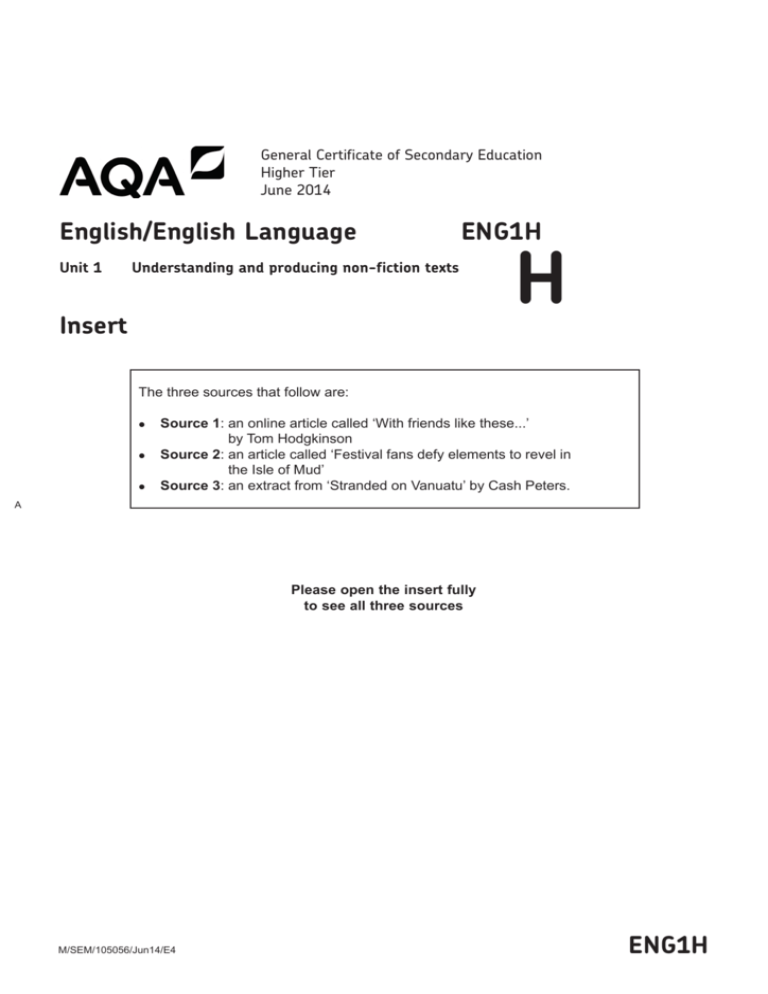
General Certificate of Secondary Education
Higher Tier
June 2014
English/English Language
Unit 1
ENG1H
Understanding and producing non-fiction texts
H
Insert
The three sources that follow are:
Source 1: an online article called ‘With friends like these...’
by Tom Hodgkinson
Source 2: an article called ‘Festival fans defy elements to revel in
the Isle of Mud’
Source 3: an extract from ‘Stranded on Vanuatu’ by Cash Peters.
A
Please open the insert fully
to see all three sources
M/SEM/105056/Jun14/E4
ENG1H
2
Source 1
theguardian
News
Sport
News
Comment
Technology
Search
Culture
Business
Money
News
Life & Style Travel
Environment
Search
TV
Facebook
With friends like these ...
by Tom Hodgkinson
I despise Facebook. This enormously successful American business describes itself as “a social
utility that connects you with the people around you”. But hang on. Why on earth would I need a
computer to connect with the people around me?
And does Facebook really connect people? Doesn’t it rather disconnect us, since instead of doing
something enjoyable such as talking and eating and dancing and drinking with my friends, I am
merely sending them little ungrammatical notes and amusing photos in cyberspace, while chained to
my desk? A friend of mine recently told me that he had spent a Saturday night at home alone on
Facebook. What a gloomy image. Far from connecting us, Facebook actually isolates us at our
workstations.
Facebook appeals to a kind of vanity and self-importance in us, too. If I put up a flattering picture of
myself with a list of my favourite things, I can construct an artificial representation of who I am in
order to get approval. It also encourages a disturbing competitiveness around friendship: it seems
that with friends today, quality counts for nothing and quantity is king. The more friends you have,
the better you are.
It seems, though, that I am very much alone in my hostility. At the time of writing, Facebook claims
59 million active users, including 7 million in the UK, Facebook’s third-biggest customer after the US
and Canada. That’s 59 million suckers, all of whom have volunteered their ID card information and
consumer preferences to an American business they know nothing about. Right now, 2 million new
people join each week. At the present rate of growth, Facebook will have more than 200 million
active users by this time next year. And I would predict that, if anything, its rate of growth will
accelerate over the coming months.
Clearly, Facebook is another capitalist experiment: can you make money out of friendship?
Facebook is profoundly uncreative. It makes nothing at all. It simply mediates in relationships that
were happening anyway.
For my own part, I am going to retreat from the whole thing, remain as unplugged as possible, and
spend the time I save by not going on Facebook doing something useful, such as reading books.
Why would I want to waste my time on Facebook when there are seeds to be sown in my own back
yard? I don’t want to retreat from nature, I want to reconnect with it. And if I want to connect with
the people around me, I will revert to an old piece of technology. It’s free, it’s easy and it delivers a
uniquely individual experience in sharing information: it’s called talking.
INSERT TO Jun14/ENG1H
3
Source 2
Festival fans defy elements to revel in the
Isle of Mud
by Kaya Burgess
Hundreds of people heading for the Isle of Wight festival were left stranded for up to ten hours on
gridlocked roads as torrential rain and flooding created a mud bath around the site.
Tractors were called in to pull car-loads of music fans through the quagmire at Seaclose Park in
Newport in a painstaking process. Many people had to sleep in their cars. About 55,000 people are
expected to attend the festival, increasing the island’s resident population of 140,000 by more than a
third.
Festival-goers complained that the organisers were under-prepared for a weekend that was forecast
to see heavy rain and blustery winds. Mark Bush, 27, said: “It’s been raining for weeks so I don’t
understand why they weren’t ready for it. I don’t know the technicalities, but surely they knew it would
be muddy.”
John Giddings, the festival organiser, tweeted: “If you are stuck in traffic or on a ferry, bear with us, it
is taking a long time to park you all — apologies.”
He confirmed that police had asked him to prepare an emergency plan to get people out of the
festival at the end of the weekend, and offered refunds to those who had turned back and given up
due to the “horrendous” weather.
The main arena, Strawberry Fields and Penny Lane areas remained closed until 4pm yesterday
because of high winds. Fans pitched tents on patches of dry land at the boggy site, where mud
flowed “like gravy”. The rock band Enter Shikari tweeted: “Oh dear. The tent we’re playing tonight at
the Isle of Wight Festival is full of water haha”.
But a typical festival resilience kicked in, and warm-up shows by The Stranglers and Primal Scream
were well received.
Copyright © The Times 06/2012
INSERT TO Jun14/ENG1H
6
There are no texts printed on this page
Acknowledgement of copyright-holders and publishers
Permission to reproduce all copyright material has been applied for. In some cases efforts to contact copyright-holders have
been unsuccessful and AQA will be happy to rectify any omissions of acknowledgements in future papers if notified.
Source 1: ‘With friends like these...’ by Tom Hodgkinson. Copyright © Guardian News & Media Ltd, 2008.
Source 2: ‘Rain-hit festival ideal for stick-in-the-mud’ by Kaya Burgess. Copyright © The Times 06/2012.
Photograph copyright © PA Images Ltd.
Source 3: Extracts from ‘Stranded in Dangerous Places’ by Cash Peters with permission from John Blake Publishing Ltd, 2010.
Copyright © 2014 AQA and its licensors. All rights reserved.
INSERT TO Jun14/ENG1H
4
Source 3
Cash Peters is a British journalist living in America. Here he is on a remote South Sea
Island making a TV programme.
Stranded on Vanuatu
Despite the hotel being a mere few feet from the water’s edge, where you’d think there’d be
a breeze, there isn’t. The air in the main bar-lounge is unbearably hot and sticky, another
harbinger, I suppose, of what lies ahead. Seriously, you could steam broccoli in here. And
of course, that makes the place a magnet to flies. Bluebottles especially. Big chubby ones
carve a zigzag path between tables, coming in to land like ghastly winged tumours in my hair
and on my bare arms to get at my sweat.
Settling down in a chair on the deck, I watch the sun slide dramatically into the ocean in a
tantrum of citrus hues, before finally throwing itself over the horizon. In its wake a dense,
hostile darkness descends, the likes of which I’ve never encountered before.
Once the light fades in Vanuatu, you’re as good as blind. It’s coal-shaft black out there.
Ghoulishly, back-of-your-closet black. Convulsing flames in small kerosene lamps
distributed among tables in the restaurant do their best to provide occasional golden pockets
of reassurance, but it’s not enough to make the slightest dent on the monolithic emptiness of
the world beyond this one.
At my feet, a lazy surf gurgles and eddies into rocky inlets barely visible through the gauze
of night. After that, several yards out and just below the surface, lies a ring of coral one
hundred metres deep. Then nothing. You don’t touch land again for another four thousand
miles - four thousand! - not until you hit the Great Barrier Reef. That fact alone has me
totally creeped out.
With the onset of night, I feel a slight chill skitter across the back of my neck. A fleeting,
barely perceptible breath, like the icy touch of winter.
A warning? Telling me I’ve committed to something I shouldn’t have.
‘You idiot, signing that goddamned contract! You know you didn’t want to. Now look at the
mess you’re in.’
Suddenly, the world I’m used to and feel comfortable in - of leafy suburbs, of food stores
open around the clock, movie theatres, Starbucks on every corner, my beautiful home - feels
like it’s in a different galaxy.
Once, when I was a little kid in England, I lost my parents in a department store. They
walked off in one direction and I got side-tracked and ran off in another. Before I realised I
couldn’t see them anymore, it was already too late; they’d gone and I was lost.
Every child has moments like that. Most, by the time they get to be adults, have assimilated
them and moved on. For some reason, I never did. That sense of abject abandonment, the
helplessness, the distress I felt sitting in the rug department crying my eyes out that day, has
stayed with me all these years: the dread of going unmissed, the fear that nobody knows
I’m here, nobody cares, and nobody’s coming back for me. And that same thumbprint of
anxiety returns to haunt me once again now, as I look out from the deck of the hotel at...
well, nothing.
INSERT TO Jun14/ENG1H
5
There are no texts printed on this page
Open out this page to see
Source 2 and Source 3
INSERT TO Jun14/ENG1H






